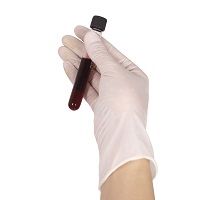Predicting Dementia from a Blood Test
The risk for developing dementia can be predicted using a blood test, according to researchers from Denmark.

A blood test has been developed that can identify the risk of developing dementia, according to research published in the Annals of Neurology.
Researchers from Rigshopitalet, Herlev Hospital and the University of Copenhagen in Denmark examined more than 75,000 participants recruited from the general population by testing whether low plasma levels of apolipoprotein E (APOE) ε4 allele (apoE) at study enrollment were linked to increased risk of future Alzheimer’s disease and all dementia. The allele is considered a major genetic risk factor for Alzheimer’s disease and dementia.
The researchers discovered the risk factor for Alzheimer’s disease and all dementia increased from the highest to the lowest apoE tertile. Hazard ratios were 2.68 and 1.80 for Alzheimer’s disease and all dementia, respectively, the researchers found. Across the various types of the apoE allele, the risk for Alzheimer’s disease and all dementia remained consistent.
“The blood test will help provide a more precise risk evaluation of a citizen’s risk of developing dementia later in life,” said Ruth Frikke-Schmidt, assistant clinical and research professor at the Faculty of Health and Medical Sciences at the University of Copenhagen and consultant physician at Rigshospitalet. “Thus the citizens at the greatest risk of developing the illness are more easily identified than at present. The blood test will enable an earlier and more focused prevention effort, thus prolonging the onset of the illness and raising the individual's quality of life.”
The researchers noted in the study that the low level of apoE in the blood most likely reflects similarly low levels of apoE in the brain. The brain’s levels may further indicated that the β-amyloid is not being effectively removed from the brain. This, the researchers concluded, the results of the study emphasize a biological mechanism.
“Over time, this increased biological knowledge about dementia can constitute a point of departure for the development of new drugs,” concluded Frikke-Schmidt.